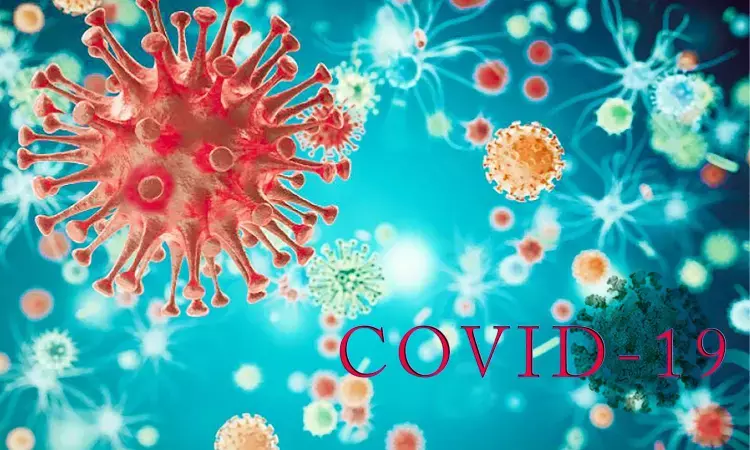- Home
- Medical news & Guidelines
- Anesthesiology
- Cardiology and CTVS
- Critical Care
- Dentistry
- Dermatology
- Diabetes and Endocrinology
- ENT
- Gastroenterology
- Medicine
- Nephrology
- Neurology
- Obstretics-Gynaecology
- Oncology
- Ophthalmology
- Orthopaedics
- Pediatrics-Neonatology
- Psychiatry
- Pulmonology
- Radiology
- Surgery
- Urology
- Laboratory Medicine
- Diet
- Nursing
- Paramedical
- Physiotherapy
- Health news
- Fact Check
- Bone Health Fact Check
- Brain Health Fact Check
- Cancer Related Fact Check
- Child Care Fact Check
- Dental and oral health fact check
- Diabetes and metabolic health fact check
- Diet and Nutrition Fact Check
- Eye and ENT Care Fact Check
- Fitness fact check
- Gut health fact check
- Heart health fact check
- Kidney health fact check
- Medical education fact check
- Men's health fact check
- Respiratory fact check
- Skin and hair care fact check
- Vaccine and Immunization fact check
- Women's health fact check
- AYUSH
- State News
- Andaman and Nicobar Islands
- Andhra Pradesh
- Arunachal Pradesh
- Assam
- Bihar
- Chandigarh
- Chattisgarh
- Dadra and Nagar Haveli
- Daman and Diu
- Delhi
- Goa
- Gujarat
- Haryana
- Himachal Pradesh
- Jammu & Kashmir
- Jharkhand
- Karnataka
- Kerala
- Ladakh
- Lakshadweep
- Madhya Pradesh
- Maharashtra
- Manipur
- Meghalaya
- Mizoram
- Nagaland
- Odisha
- Puducherry
- Punjab
- Rajasthan
- Sikkim
- Tamil Nadu
- Telangana
- Tripura
- Uttar Pradesh
- Uttrakhand
- West Bengal
- Medical Education
- Industry
Pregnant women infected with COVID-19 at higher risk of death, complications: Study

USA: A recent study published in BMJ Global Health has revealed that SARS-CoV-2 infection at any time during pregnancy increases the risk of severe maternal morbidities, maternal death, and neonatal morbidity, but not stillbirth.
Researchers found that pregnant women infected with the virus that causes COVID-19 face seven times increased risk of dying and a significantly elevated risk of being admitted to an intensive care unit or suffering from pneumonia.
According to the researchers, the findings reinforce the need for global efforts to minimise these infection risks during pregnancy through targeted vaccination campaigns and other protective measures.
There’s a vast and growing body of research on COVID-19 infection during pregnancy. But extensive differences in study design, methods, and comparison groups make it difficult to reach any firm conclusions, added to which few studies have been done in low-income countries, say the researchers.
The researchers formed an international consortium in April 2020 to obtain high-quality prospective data from relevant studies in several countries. They applied a uniform analytical approach to avoid the issues associated with previous research.
The current research, which comprises the results of the first individual-level pooled data analysis of those studies, assesses the risks of ill health and death among pregnant women with or without confirmed or probable COVID-19 infection.
The analysis is based on participants in 12 studies involving 13,136 pregnant women in Ghana, China-Hong Kong, Italy, Kenya, Nigeria, South Africa, Spain, Sweden, the Democratic Republic of Congo, Turkey, Uganda, and the USA.
It shows that pregnant women infected with SARS-CoV-2, the virus responsible for COVID-19 infection, were nearly eight times as likely to die as their uninfected peers.
And they were nearly four times as likely to require intensive care, 15 times as likely to require mechanical ventilation, and more than five times as likely to need any critical care.
They were also more than 23 times as likely to be diagnosed with pneumonia and more than five times as likely to have serious blood clots.
Babies born to women with COVID-19 infection were nearly twice as likely to be admitted to a neonatal care unit, nearly 3 times as likely to be born moderately premature (before 34 weeks); and 19% more likely to be underweight at birth than babies born to uninfected women.
But unlike the findings of previous reviews, COVID-19 Infection wasn’t linked to a heightened risk of stillbirth at or beyond 28 weeks of pregnancy, nor restricted growth.
The researchers point to some limitations of their study. The selection of pregnant women with COVID-19 depended on when and how they were tested for SARS-CoV-2; this changed over time across sites, along with the availability of test kits. The analysis didn’t consider the differential impact of SARS-CoV-2 variants that have emerged since the pandemic started. Some outcomes weren’t monitored for a clinically meaningful period either.
Notwithstanding these caveats, “These findings underscore the need for global efforts to prevent COVID-19 during pregnancy through targeted administration of vaccines and non-pharmaceutical interventions,” say the researchers.
This is particularly important: “Global guidance has been equivocal on the potential risks of infection and benefits and safety of vaccination, and more than 80 countries do not currently recommend that all pregnant and lactating women should be vaccinated,” they point out.
Reference:
Smith ER, Oakley E, Grandner GW Perinatal COVID PMA Study Collaborators, et alAdverse maternal, fetal, and newborn outcomes among pregnant women with SARS-CoV-2 infection: an individual participant data meta-analysisBMJ Global Health 2023;8:e009495.
Dr Kamal Kant Kohli-MBBS, DTCD- a chest specialist with more than 30 years of practice and a flair for writing clinical articles, Dr Kamal Kant Kohli joined Medical Dialogues as a Chief Editor of Medical News. Besides writing articles, as an editor, he proofreads and verifies all the medical content published on Medical Dialogues including those coming from journals, studies,medical conferences,guidelines etc. Email: drkohli@medicaldialogues.in. Contact no. 011-43720751


